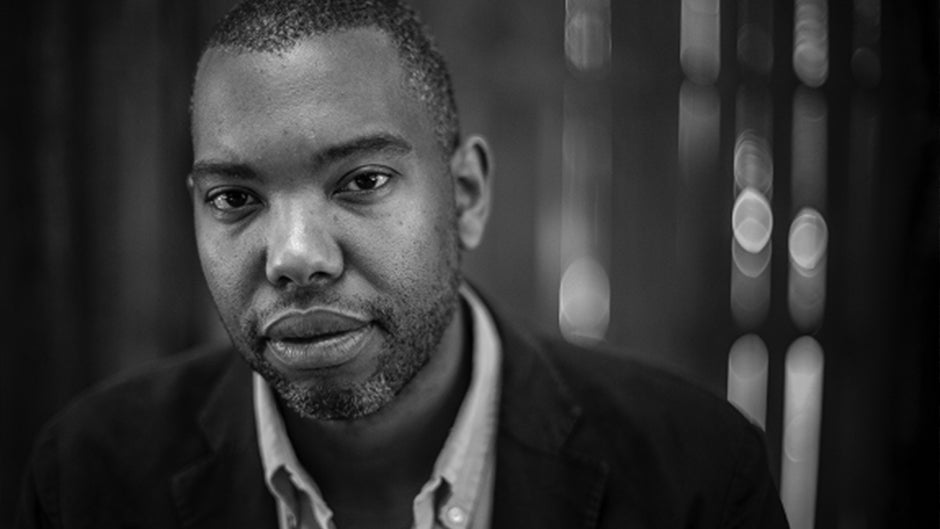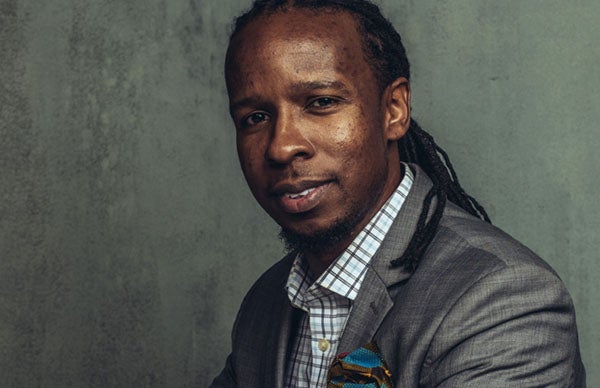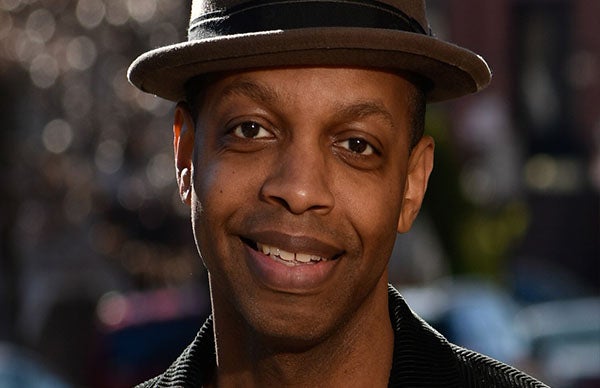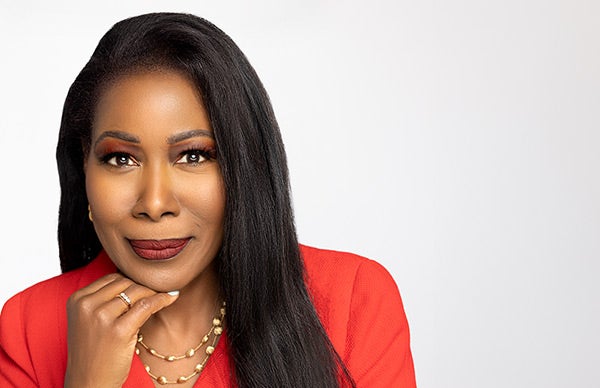Ta-Nehisi Coates
#1 New York Times bestselling author of Between the World and Me and The Message

Photo credit: Gabriella Demczuk
-
About Ta-Nehisi Coates
“Ta-Nehisi Coates is the James Baldwin of our era.”
— Isabel Wilkerson, author of The Warmth of Other SunsIn his work as a National Book Award-winning writer and formerly as a National Correspondent for The Atlantic, Ta-Nehisi Coates emerged as an essential voice for our times. During his time reporting for The Atlantic between 2008-2018, he penned numerous articles and essays, including the National Magazine Award-winning 2012 essay Fear of a Black President and the influential June 2014 essay The Case For Reparations.
As a journalist with a career spanning over two decades, Ta-Nehisi Coates has written for numerous publications including The Washington City Paper, The Village Voice, The New Yorker, and The New York Times. His award-winning writing combines reportage, historical analysis, and personal narrative to address some of America’s most complex and challenging issues pertaining to culture and identity.
He is also the author of the bestselling books The Beautiful Struggle, We Were Eight Years in Power, the NAACP (National Association for the Advancement of Colored People) finalist The Water Dancer, and Between the World and Me, which won the National Book Award in 2015. He was a recipient of a MacArthur Fellowship that same year. Coates also enjoyed a successful run writing Marvel’s Black Panther (2016-2021) and Captain America (2018-2021) comics series. In 2020, HBO released a critically-acclaimed adaptation of Between the World and Me, directed by Kamilah Forbes.
Coates’s latest work, The Message, is about the urgent need to untangle ourselves from the destructive myths that shape our world—and our own souls—and embrace the liberating power of even the most difficult truths. Written at a dramatic moment in American and global life, The Message‘s three intertwining essays reckon with the clash between history, storytelling, and reality as Coates journeys from West Africa to the American South to Palestine.
Ta-Nehisi Coates is currently a contributing editor at Vanity Fair, and is writing the screenplays for the upcoming films Wrong Answer, Superman, and the film adaptation of his first fiction novel, The Water Dancer. He is the Sterling Brown Endowed Chair at Howard University in the English department.
Contact us to learn more about booking Ta-Nehisi Coates for your next event.
-
Speaking Topics
A Conversation with Ta-Nehisi Coates
Ta-Nehisi Coates’s powerful, thought-provoking, and eye-opening conversations address systemic injustice, current events, and how they intersect with and are affected by the media. His events often explore the historical and contemporary experiences of Black Americans, discussing themes of race, identity, and equality and confronting uncomfortable truths about America’s role in history. Coates challenges audiences to consider new perspectives and follow his lead in speaking—and writing—truth to power.
On Writing
How do stories shape our versions of truth? And what should we do when narratives clash with reality? Ta-Nehisi Coates is renowned for his clarifying, courageous, and purposeful work in cultural criticism, fiction, and journalism. In this conversation on craft, Coates explores the importance of creating, questioning, and exposing narratives, and his own journey as a writer.
Categories: Black History Month Speakers, Bestselling Author Speakers, College + University Speakers, Current + Social Issues Speakers, Diversity, Equity & Inclusion Speakers, Fiction + Literary Speakers, Film and TV Adaptation Speakers, First-Year Experience Speakers, History Speakers, Journalist Speakers, MacArthur Fellow Speakers, Politics + Government Speakers, Social Justice Speakers -
Video
-
Praise for Ta-Nehisi Coates
Praise for The Message
Ever since his Baldwin-inflected Between the World and Me, Coates has been known for his incisive (and sometimes uncomfortable) cultural and political commentary. Here he journeys from West Africa to the American South to Palestine to examine how the stories we tell can fail us, and to argue that only the truth can bring justice.
— The Boston GlobeAn earnest and intimate exploration of locations of extreme injustice, and of the power of writing to render a more compassionate—and more honest—future . . . At once a rallying cry and a love letter to writing itself, the book is an urgent reminder that ‘politics is the art of the possible, but art creates the possible of politics.
— Oprah DailyPraise for The Water Dancer
Nearly every paragraph is laced through with dense, gorgeously evocative descriptions of a vanished world and steeped in its own vivid vocabulary.
— Entertainment WeeklyCoates balances the horrors of slavery against the fantastical. He extends the idea of the gifts of the disenfranchised to include a kind of superpower. But The Water Dancer is very much its own book, and its gestures toward otherworldliness remain grounded. In the end, it is a novel interested in the psychological effects of slavery, a grief that Coates is especially adept at parsing. . . . In Coates’s world, an embrace can be a revelation, rare and astonishing.
— Esi Edugyan, The New York Times Book ReviewThe most surprising thing about The Water Dancer may be its unambiguous narrative ambition. This isn’t a typical first novel. . . . The Water Dancer is a jeroboam of a book, a crowd-pleasing exercise in breakneck and often occult storytelling that tonally resembles the work of Stephen King as much as it does the work of Toni Morrison, Colson Whitehead and the touchstone African-American science-fiction writer Octavia Butler. . . . It is flecked with forms of wonder-working that push at the boundaries of what we still seem to be calling magical realism.
— Dwight Garner, The New York TimesWhile neither polemical nor wholly fantastical, the story draws on skills [Coates] developed in those other genres. . . . The story’s bracing realism is periodically overcome by the mist of fantasy. The result is a budding superhero discovering the dimensions of his power within the confines of a historical novel that critiques the function of racial oppression. . . . Coates isn’t dropping supernatural garnish onto The Water Dancer any more than Toni Morrison sends a ghost whooshing through Beloved for cheap thrills. Instead, Coates’s fantastical elements are deeply integral to his novel, a way of representing something larger and more profound than the confines of realism could contain.
— The Washington PostMythic language pervades the work of Ta-Nehisi Coates. . . . With The Water Dancer . . . we pay witness to a writer unchained . . . a writer finally able to marry novelistic tendencies to the form. . . . The fistfuls of firmament Coates is able to bring back to us are a wonder to behold. . . . The horrors depicted never felt rote or part of any genre rulebook. In highlighting families, Coates made his characters individuals. . . . Elements of the adventure novel, of the heist novel, of the romance are all there. But Coates expertly subverts the expectations each of those labels carries. . . . The book does not lack for scene-stealers. . . . Who is he talking to when he demands remembering? He’s talking to us. All of us.
— Tochi Onyebuchi, TordotcomStudied and meticulous, the novel is a slave narrative that depicts the quotidian horrors of family separation. Even so, it’s remarkably tender: The Water Dancer is also a romance.
— The AtlanticAn experience in taking [Toni] Morrison’s ‘chances for liberation’ literally: What if memory had the power to transport enslaved people to freedom?’ . . . The most moving part of The Water Dancer [is] the possibility it offers of an alternate history. . . . The book’s most poignant and painful gift is the temporary fantasy that all the people who leaped off slave ships and into the Atlantic were not drowning themselves in terror and anguish, but going home.
— NPRAn electrifying, inventive novel . . . [Coates] loses none of his mastery for conveying complex ideas and blending a deep knowledge of American history with scintillating wordsmanship. . . . His craft shows on every page. He gives this story—and these men and women—the care and space they demand and deserve. . . . A haunting adventure story told through the tough lens of history, The Water Dancer is a quintessentially American story of self-creation, doubt, and elevation.
— The Boston GlobeThe best writers—the best storytellers, in particular—possess the enchanting, irresistible power to take the reader somewhere else. Ta-Nehisi Coates imagines the furthest reach of that power as a means to transcend borders and bondage in The Water Dancer, a spellbinding look at the impact of slavery that uses meticulously researched history and hard-won magic to further illuminate this country’s original sin. . . . Exploring the loaded issues of race and slavery has become yet more fuel for today’s culture wars, but an underlying message of liberation through the embrace of history forms the true subject of The Water Dancer. . . . Coates envisions the transcendent potential in acknowledging and retelling stories of trauma from the past as a means out of darkness. With recent family separations at the U.S. border, this message feels all the more timely.
— Los Angeles TimesPraise for We Were Eight Years in Power
We Were Eight Years in Power could have settled for being the obligatory miscellany that too often follows a writer’s masterpiece; instead, the book provides a master class on the essay form…[A]s convincing in its restraint and pacing as it is in its depth of research and recognition of black humanity. As Coates turns the heat lower, his brilliance cooks more evenly – and more urgently. Coates’s book brings us to a boil, then lets us simmer, and anyone who wants to know who we are – and where we are now – must sit with him for a good while. It should inspire us as writers, and as Americans, that he urges us, in exile or online, to become better – or at least clearer on why we’re not.
— Kevin Young, New York Times Book ReviewWe Were Eight Years in Power is more than a “loose memoir”; it’s Coates giving himself a deep read, and inviting us to join him in this look at his intellectual journey. And by showcasing a range of essays he asks his readers to consider him as a writer, nothing more and nothing less.
— SlateCoates eloquently unfurls blunt truths in his latest book…There is no sugarcoating, no effort to cloak the nation's underbelly in order to soothe those who do not want to believe it exists. Some may find Coates' words validating. Others may pronounce them a bleak sermon or even a eulogy for the dashed possibilities imagined by some when Obama was first elected. But however you see this collection, there is no disputing that Coates writes what he means and speaks what he feels. To have such a voice, in such a moment, is a ray of light.
— USA TodayAs [Coates] explains throughout these pages, black Americans struggle out of fear for their and their children’s lives; they struggle to avoid their feelings … Coates’ writing emerges from this struggle while articulating a way of holding this madness at bay aesthetically and intellectually…..Across his oeuvre, Coates’ prose style and literary prowess are hip-hop sharpened: he believes in the art of dexterous reference, potent, lyrical critique and political storytelling…Coates couches his analyses in a synthesis of investigative and reported journalism, African American studies, political science, sociology, literary criticism and American history…Coates fronts each piece with context-shaping, prefatory narratives. In total, the personal writing develops a portrait of the artist…Reading American life through Coates’ lens these last eight years has forced his many readers (myself included) to improve their own habits of reasoning and skills for argumentation. As the best critics do, Coates draws us into conversation, into argument, rather than closing off discourse with canned proclamations or static resolutions…by the end of We Were Eight Years in Power we can hear the Jim Crow South echoing loudly in the Trump administration.
— Baltimore SunAs you read We Were Eight Years in Power, you’ll hear Coates incrementally refine and clarify his distinctive voice — steeped in poetry and hip-hop and the rhetoric of black liberation — into the formidable tool it’s become today…Beautiful prose, for Coates, is necessarily honest prose…The drive to render this reality with honesty and clarity creates Coates’s evocative, emphatic sentences.
— VoxCoates has become one of the most vital and respected voices in the cultural and political conversation. This newest collection pairs some of his most widely-shared Atlantic pieces with new work exploring Coates’s personal thoughts on Obama’s tenure in the White House. Part memoir, part historical journalism, We Were Eight Years in Power is an essential text to help us understand the America we’re living in today.
— W MagazineA new book from Coates is not merely a literary event. It’s a launch from Cape Canaveral. There’s a lot of awe, heat, resistance… We Were Eight Years in Power is as a selection of Coates’s most influential pieces…[but] the book is actually far more than that…[Coates is] the pre-eminent black public intellectual of his generation.
— Jennifer Senior, New York TimesIt is a look at the history of race in America. It is an unapologetic laying out of facts. More than anything, We Were Eight Years in Power settles an argument: If, by chance, we ever came together to draft someone to pen the story of being black in America, there is no doubt that Ta-Nehisi Coates should be the consensus first-round pick…the compilation of essays…examines every detail of the first black presidency in microscopic, high-definition detail…We Were Eight Years in Power is a detailed examination of Obama’s America, but its findings are, in truth, Coates’ historically informed diagnosis of America itself. It is an annotated, full-throated analysis of the historical disease of white supremacy, often euphemized as “American greatness,” and how it led to the terminal condition of Trumpism. That is why, with the first pick of 2017, black America, for its unequivocal, unabashed truth, selects Ta-Nehisi Coates’ We Were Eight Years in Power.
— The RootThere is a fresh clarity to [Coates’] voice — urgent, outraged, electric — that’s never felt more necessary.
— Entertainment WeeklyThough the essays are about a particular period, Coates’s themes reflect broader social and political phenomena. It’s this timeless timeliness—reminiscent of the work of George Orwell and James Baldwin—that makes Coates worth reading again and again.
— Publishers Weekly (starred review)Biting cultural and political analysis from the award-winning journalist . . . [Ta-Nehisi Coates] reflects on race, Barack Obama’s presidency and its jarring aftermath, and his own evolution as a writer in eight stunningly incisive essays. . . . He contextualizes each piece with candid personal revelations, making the volume a melding of memoir and critique. . . . Emotionally charged, deftly crafted, and urgently relevant.
— Kirkus Reviews (starred review)Ta-Nehisi Coates has published a collection of the major magazine essays he wrote throughout the Obama years. . . . But Coates adds an unexpected element that renders We Were Eight Years in Power both new and revealing. Interspersed among the essays are introductory personal reflections. . . . Together, these introspections are the inside story of a writer at work, with all the fears, insecurities, influences, insights and blind spots that the craft demands. . . . I would have continued reading Coates during a Hillary Clinton administration, hoping in particular that he’d finally write the great Civil War history already scattered throughout his work. Yet reading him now feels more urgent, with the bar set higher.
— Carlos Lozada, The Washington PostCoates’s always sharp commentary is particularly insightful as each day brings a new upset to the cultural and political landscape laid during the term of the nation’s first black president. . . . Coates is a crucial voice in the public discussion of race and equality, and readers will be eager for his take on where we stand now and why.
— Booklist (starred review)Praise for Between the World and Me
I’ve been wondering who might fill the intellectual void that plagued me after James Baldwin died. Clearly it is Ta-Nehisi Coates. The language of Between the World and Me, like Coates’s journey, is visceral, eloquent, and beautifully redemptive. And its examination of the hazards and hopes of black male life is as profound as it is revelatory. This is required reading.
— Toni MorrisonPowerful and passionate . . . profoundly moving . . . a searing meditation on what it means to be black in America today.
— Michiko Kakutani, The New York Times[Between the World and Me] is not a Pollyanna, coming-of-age memoir about how idyllic life was growing up in America. It is raw. It is searing. . . . [It’s] a book that should be read and shared by everyone, as it is a story that painfully and honestly explores the age-old question of what it means to grow up black and male in America.
— The Baltimore Sun“A searing indictment of America’s legacy of violence, institutional and otherwise, against blacks.
— Chicago TribuneI know that this book is addressed to the author’s son, and by obvious analogy to all boys and young men of color as they pass, inexorably, into harm’s way. I hope that I will be forgiven, then, for feeling that Ta-Nehisi Coates was speaking to me, too, one father to another, teaching me that real courage is the courage to be vulnerable, to admit having fallen short of the mark, to stay open-hearted and curious in the face of hate and lies, to remain skeptical when there is so much comfort in easy belief, to acknowledge the limits of our power to protect our children from harm and, hardest of all, to see how the burden of our need to protect becomes a burden on them, one that we must, sooner or later, have the wisdom and the awful courage to surrender.
— Michael ChabonTa-Nehisi Coates is the James Baldwin of our era, and this is his cri de coeur. A brilliant thinker at the top of his powers, he has distilled four hundred years of history and his own anguish and wisdom into a prayer for his beloved son and an invocation to the conscience of his country. Between the World and Me is an instant classic and a gift to us all.
— Isabel Wilkerson, author of The Warmth of Other SunsExtraordinary . . . [Coates] writes an impassioned letter to his teenage son—a letter both loving and full of a parent’s dread—counseling him on the history of American violence against the black body, the young African-American’s extreme vulnerability to wrongful arrest, police violence, and disproportionate incarceration.
— David Remnick, The New YorkerBrilliant . . . a riveting meditation on the state of race in America . . . [Coates] is firing on all cylinders, and it is something to behold: a mature writer entirely consumed by a momentous subject and working at the extreme of his considerable powers at the very moment national events most conform to his vision.
— The Washington PostAn eloquent blend of history, reportage, and memoir written in the tradition of James Baldwin with echoes of Ralph Ellison’s Invisible Man . . . It is less a typical memoir of a particular time and place than an autobiography of the black body in America. . . . Coates writes with tenderness, especially of his wife, child, and extended family, and with frankness. . . . Coates’s success, in this book and elsewhere, is due to his lucidity and innate dignity, his respect for himself and for others. He refuses to preach or talk down to white readers or to plead for acceptance: He never wonders why we just can’t all get along. He knows government policies make getting along near impossible.
— The Boston GlobeFor someone who proudly calls himself an atheist, Coates gives us a whole lot of ‘Can I get an amen?’ in this slim and essential volume of familial joy and rigorous struggle. . . . [He] has become the most sought-after public intellectual on the issue of race in America, with good reason. Between the World and Me . . . is at once a magnification and a distillation of our existence as black people in a country we were not meant to survive. It is a straight tribute to our strength, endurance and grace. . . . [Coates] speaks resolutely and vividly to all of black America.
— Los Angeles TimesA crucial book during this moment of generational awakening.
— The New YorkerA work that’s both titanic and timely, Between the World and Me is the latest essential reading in America’s social canon.
— Entertainment WeeklyCoates delivers a beautiful lyrical call for consciousness in the face of racial discrimination in America. . . . Between the World and Me is in the same mode of The Fire Next Time; it is a book designed to wake you up. . . . An exhortation against blindness.
— The GuardianPraise for The Beautiful Struggle
Ta-Nehisi Coates is the young James Joyce of the hip-hop generation.
— Walter MosleyHaunting and healing . . . a splendid memoir.
— EssenceA brilliant coming-of-age story.
— PeopleA remarkable, blunt portrait of an adolescence filled with danger, chaos, flaws, and tragedy . . . a love story, dispatched from the front lines of a family.
— Time Out New YorkA searing and soulful memoir.
— Michael Eric Dyson, author of April 4, 1968 -
Books by Ta-Nehisi Coates
-
Media About Ta-Nehisi Coates
Request Fees
and Availability
- 212 572-2013
- Ta-Nehisi Coates travels from New York, NY
Featured Title

The Message
“[Coates] is intellectually fearless . . . unshackled by political or racial ideology, humane in his judgments, respectful of facts, acutely aware of the difference between what is knowable and what is not.”—The New Yorker
The #1 New York Times bestselling author of Between the World and Me journeys to three resonant sites of conflict to explore how the stories we tell—and the ones we don’t—shape our realities.



















